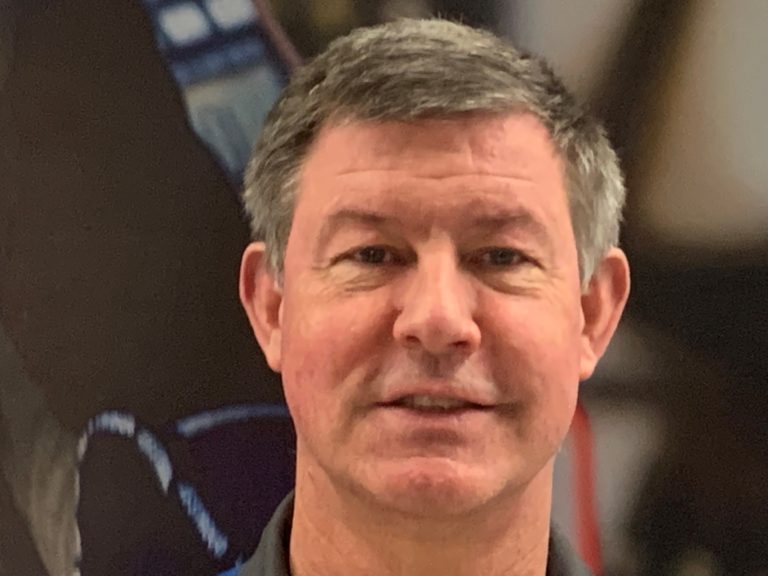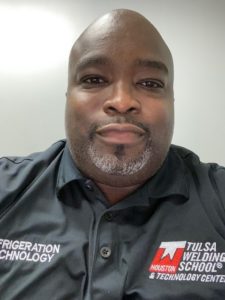Lee Doubleday: Hello and welcome to our second episode of the Skilled Trade Career series on Imagine America Radio, where we focus specifically on skilled trade careers. Joining us today is David Heiman, the senior director of training at RSI, and O’Neil Fuller, the lead instructor of refrigeration technology for their Tulsa Welding School Houston camp. For those of you who don’t know, RSI started in 1965 to train HVAC and refrigeration technicians. RSI has added programs for electrical technologies, electromechanical technologies, and welding to respond to the growing demand for entry-level electricians, facility maintenance technicians, and welders. The Refrigeration School, Inc.—or RSI—is accredited by the Accrediting Commission of Career Schools and Colleges, and their mission is to assist learners in the development of skills and knowledge necessary for employment and professional growth. Today, we want to discuss the future of HVAC careers. As a leading provider of education in HVAC programs, we couldn’t think of anybody better to call than David and O’Neil with the Refrigeration School. Let’s start by telling our listeners exactly what an HVAC technician is. David, can you briefly explain what an HVAC technician does? |
David Heiman: Absolutely. An HVAC technician—or heating ventilation, air conditioning, and refrigeration technician—is a technician that goes out and make sure that you have not only air conditioning in your homes or your apartments, but also takes care of any of the refrigeration needs—whether it’s your local food store where you want to get your cold food, whether it’s a data center or a hospital that has a very large refrigeration footprint, or whether or not they deal with airflow situations and military installations. The technician’s job is to maintain and do preventative maintenance and installation of the comfort systems that we rely on. |
Lee: Awesome. So now that we have a better understanding of what an HVAC technician does, O’Neil, can you briefly explain the career opportunity for HVAC technicians? I mean, you see these students every day, and so you can kind of give me some insight here. What does the Bureau of Labor Statistics say about the demand for HVAC technicians, maybe both nationally but also within Arizona? |
O’Neil Fuller: Well, overall, the HVAC carriers are expected to grow 5% from 2020 to 2030. In the same time—the span of 2020 to 2030—job growth is expected to be, what, 21% in Arizona alone. So, if in this trade of HVAC, there’s a lot of opportunity where people can grow and take their life to the next level. |
Lee: Yeah, I mean, I knew HVAC technicians were in high demand, but I didn’t realize the job was approximately 21% from 2020 to 2030 in Arizona alone. That’s great. That’s great. Okay. Well, I have sort of a three-parted question for you, O’Neil. With it being in such high-demand field, should someone go to school to learn how to become an HVAC technician? And what would you say to someone who says they can just learn how to be an HVAC technician through an apprenticeship program or maybe their mom or dad taught them? |
O’Neil: The thing about it—you can learn the trade out there without going to school. I can tell you about that because I did that myself. The thing is, I realized when I went back to school—I realized I was making a lot of mistakes that could be prevented if I did know better. So, I can attest to that that school really do help. When you go back to school, they teach you the ins and out of the trade, the right way to do stuff. Unfortunately, sometime we do stuff and it work, and we don’t even know how it work. We know we touch a button, we change a wire, and it work. But when you go back to school, you understand what it really takes to let it work, so I would recommend it. |
Lee: Yeah, I would just add to that. The teacher’s own experience, having been in the field, can save you a lot of time and hassle trying to figure something out because the teacher has likely already run into that issue before. They know exactly what’s going on. To your point, they can tell you what is going on, why it’s not working. |
O’Neil: Why it’s not working. |
Lee: And explain why it is that you do it rather than just somebody telling you, “This is what you do.” |
O’Neil: Yes, sir. |
Lee: All right. Now let’s talk about length of program. How long is an HVAC program, and what does the curriculum look like? What types of classes are taught in the HVAC and refrigeration program? I’ll leave this one up to you, David. |
David: Okay. So basically, our RT program—our refrigeration technology program—is a six-month program. And we start all the students off in a class called fundamentals of electricity, where we help the students become smarter not deader—essentially teach them to respect and work around electricity. Additionally, we go through 17 of the most common electrical control parts that you’re going to use in HVAC systems. We go through motor troubleshooting, compressor troubleshooting. And the students learn how to use their multimeter, which is a meter that takes voltage, current, resistance readings, as well as temperature and capacitance readings within that class. When they graduate that class, they’ll go to refrigeration technologies or fundamentals of refrigeration, where we cover the other 15% of the issues you might see out in the field. About 85% of the issues in the field are electrical, which is why we put such a huge emphasis on it. 15% is the mechanical side. |
We teach the students how to evaluate a system that is completely welded up—we call that hermetically sealed—and know what’s going on just by looking at the pressures and the temperatures within the system. We then go into our phase six, which is our comfort systems residential, where now we build on the experience and knowledge that they gained in the first two phases. And we introduce them into gas heat and heat pumps, and a little bit into oil heat. They leave phase six, they go into phase seven, which is comfort systems commercial. Now we can help them get their universal certification, which all technicians need in order to work on systems that contain refrigerant. We teach them how to braze. We teach them how to remove and install compressors and motors. And we teach them variable refrigerant flow systems, PTAC systems, mini-splits, and how to do electronic troubleshooting on seven or eight different lab boards. When they leave phase seven, they’re then going to go into our advanced troubleshooting. |
Our advanced troubleshooting class basically takes all the prior knowledge and forces a student to be able to show the instructor that they truly understand the fundamentals and the basics of refrigeration. It includes timed troubleshooting, where you have two and a half minutes to find an electronic problem or electrical problem with the system. It now expands the mechanical troubleshooting to the twenty ways systems die a horrible screaming death, and it introduces airflow, which is a critical component that’s often overlooked in schools. The very last class is called refrigeration principles. And basically, what it deals with is all of your low temp. So now we’re talking about reach-ins, walk-ins. We’re talking about ice machines. We’re talking about chillers—anything that keeps food or medicines cold and ready to utilize. |
Lee: Wow. Yeah, that’s pretty extensive. It sounds like the full gamut of everything you could possibly want to know about refrigeration. That’s great. Sticking with David, what are some new technological innovations in this industry and how have HVAC and refrigeration units added in computers and digital technology? Which I know you really kind of just touched on a little bit. But why is it so important to train students on this new technology for these units? |
David: Well, the reason being is because technology changes. So, one of the advantages our graduates have is they can come back and sit back through our class—any class that they graduated from—and we offer that to them for a lifetime benefit. As technologies changes, as we get more and more smarter communicating type systems, there seems to be a customer demand out there where everyone can talk to every component within their home, even when they’re not in their home. All these technologies need to be covered. Something as simple as a smart thermostat that allows you to program it for the times of day you’re not going to be there—all the way up to a self-communicating system, which varies its energy use based on the need of the environment. So as these technologies changed, our partners in the field—our employers—come and visit us twice a year and they tell us, “This is what they’re seeing.” Additionally, there are six members of the RSI staff here in Phoenix that are still licensed, bonded contractors who go out after work and work and install the brand-new systems. So, it’s critical to these new communicating technologies. |
Lee: Wow. Yeah. I mean, I can only imagine—major companies, they want to know exactly how much it costs to keep things cool. I mean, that’s a huge budgeting piece of how they start the year every year. And that’s really cool. Okay. O’Neil, I have a question for you. What’s the difference between commercial and residential HVAC? What are the different types of careers, I guess you could say, between commercial and residential? |
O’Neil: Right. There’s a couple of differences. Example, residential—that’s when we talk about the home that we live in, so the home that people live in. So, we mostly deal with people at their home. So that’s one of the simplest definition. And then for the commercial, we deal with the workplace. So that’s where we do both the work. So big rooftop unit, you’re mostly on the roof or somewhere. So those are some of the simplest example. |
Lee: Are the units basically the same or are they much larger on commercial? |
O’Neil: Much larger on commercial. So basically, residential from zero- to five-ton and then five-ton to up, we’ll consider light commercial and commercial units. So, you’ll have bigger component, bigger parts—same refrigeration principles, but just bigger component. |
Lee: Got you. All right. Now sticking with you, O’Neil, what are some of the career options for HVAC and refrigeration and electrical graduates that you’re seeing? |
O’Neil: Okay, a lot. [laughter] Most of our student, they’ll start off as an entry-level helper, technician, or installer, and depends on how fast they learn the trade then they can step up into service tech role. And most of the they do that, but this trade—most of the time it depend on the student, how fast they go through the ranks. The more you learn, the better you are. And that’s one of the reason why I love this trade. It kind of—I would say individual basis, so it depend on you where you end up in the trade. So, you can start out as an installer the next couple of months, you become our service tech. So there’s installer, service tech, controls—you can get into controls. That’s when you’re a more senior-level tech. So there’s a lot of different opportunities for students. |
Lee: That’s great. And I’m sure that some of your students—and I’m sure that this has happened in the past—that they get into the role and then they decide, “You know what, I think I could maybe slide into more of a manager role,” or sort of moving outside of just the trade and sort of into different opportunities. |
O’Neil: Yeah. A lot of students try to do that. When you come in and get introduced to the trade, sometimes you don’t know which way to go. And then by the time they get to what? The four, fifth class—they make a decision whether they want to go residential or commercial. |
Lee: Yeah. And as we’re talking, I’m sitting here thinking, what is my perception of an HVAC technician or what first comes to my mind when I think of that? And I usually think about somebody that has their own van, whether it’s their own company or they’re a contractor. And I’m sure you have students that end up starting their own company and have their own van and maybe a couple of employees with the van. |
O’Neil: Yes. Eventually, yes. Yeah. Well, that’s the goal. Most of the time, that’s a goal. Most people want to own their own business. So, this is the starting place to go. |
Lee: Sure. Yeah, I mean, if you’re pretty entrepreneurial by nature, this would be a great career path for you because you get the skills that you need to learn to be able to do it. And then you can teach people how to do it and start your business. That’s great. Okay. Now let’s say that I’m a student and I’m interested in an HVAC program. What are some things that you think I should be looking for? Because it seems to me that it’s important that a school is accredited. But what else should I be looking for? Should I be looking for flexible hours—school hours? Should I be looking for teacher experience? Maybe relationships with employers? I know that’s a big one. Can you give me sort of a checklist of things that I should be looking for in a school that offers this program? |
O’Neil: So basically, accreditation—some of the points you touched on is great. Teachers’ experience, because if you have the best teacher, right, that’s where you want to go. So, teachers’ experience is a plus. How long the school been around? How long the school been open? Or a placement rate. Do these guys, when they graduate from the program, do they get a job? So those are some of the stuff that we’re looking to. Pay the lab a visit, check the lab out. So, you can get a tour to see what are you going to working on, what’s the background of the school, and all that stuff. So those are some good points. |
David: The main thing is what is the return on the investment? So, we hear oftentimes with the nonskilled trades, those who end up going into universities, they end up paying a great deal of money for degrees that do not necessarily translate into a great return on investment. You have a lifetime placement, and students need to understand that there’s a vetting process around what that placement really looks like. So, in order for us—according to the ACCSC accreditation—to get a student placed, the student has to let us know who they’re employed by. We have to contact the employer. The employer must get back to us with a job description. And that job description must absolutely translate into one of the technologies we offer. So last year, we were—over here at RSI in Phoenix, we’re at 91% placement. So, I put that out there for any college to even come remotely close with those numbers, and they’re not even required to publicize what those numbers are. |
Lee: Well, you’re preaching to the choir over here, brother. |
O’Neil: Yeah. |
Lee: Yeah. It is definitely unfair. And I see why maybe they may not want to put their numbers up, because I myself went to traditional school and ended up getting a degree in political science. And now I’m doing a podcast. So, you tell me how that translates. [laughter] But, hey, listen, we deal with high school counselors and parents all the time, and some of these individuals may be looking for ways to guide their students or family members into a career that’s the right fit for them. So, what would you say—O’Neil, you deal with students a lot, so, what would you say are two to three personality traits that make a great HVAC technician that might help identify people that are a great fit for this career? |
O’Neil: First one, I would say they like to use their hands—want to work with their hands. The next thing they need to understand, this is not an office job, so they’ll be out and about on the roof, deal with a lot of different temperature outside in the air. And basically, if you like dealing with people, sometimes that’s a plus. And if you don’t like dealing with people, you can get commercial job where you don’t deal with people that much. So those are some of the benefits on the trade, I would say. But you have to be able to want to work with your hands. And the next thing is willing to study information. In our trade, information is key. All right. So, I would think those are some of the best trait. |
Lee: Anything you want to add to that, David? |
David: No, I think O’Neil hit ’em right on the head. I think the only thing that I would add is that it’s important for any technician or anybody thinking about the skilled trades, you need to remain hungry and humble. You need to remain hungry, to O’Neil’s point, because the technology changes all the time and you need to be able to adapt with it. And you need to remain humble because, first of all, no one can know everything. And if you’re humble and hungry, those of us who’ve been doing this for a very long time and learned from our failures will help you. |
O’Neil: Exactly. |
Lee: Yeah, that is well put. Well, hey, listen, I want to thank you both for joining the podcast today. That does wrap it up for us. |
| |
Well, thank you both for joining the call today. It’s been another great episode of Imagine America Radio, and we’re wishing you the best. |











